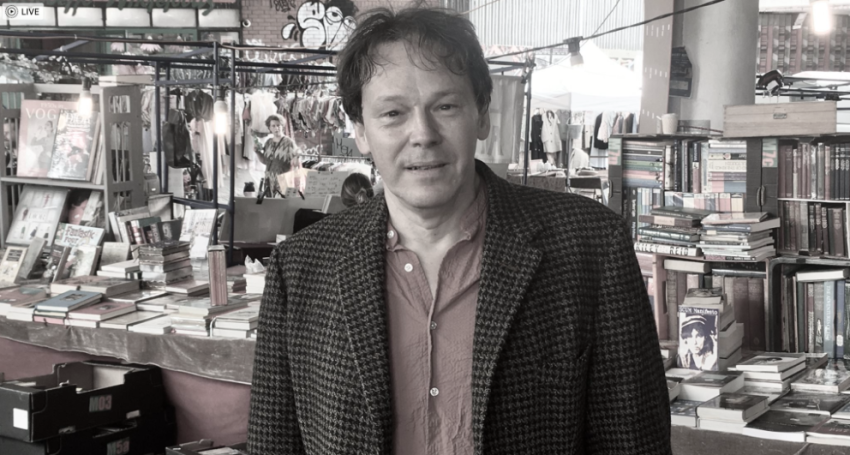
It is with great sorrow that we learned of the death of our comrade David Graeber, anti-capitalist activist and writer, iconoclastic public intellectual and unwavering supporter of the Kurdish freedom struggle.
David was holidaying in Venice with his partner, Nika Dubrovsky, when he complained of feeling unwell and developed massive internal bleeding. He died on September 3.
At 59, he was too young to die, although he would have been well aware that he had already lived past the average life span for most of humanity. His death leaves a huge void, but his life was an inspiration for all those struggling to build a better world.
David was born into a left-wing Jewish working-class family in New York. His mother, Ruth, was a garment worker and strong trade unionist. His father, Ken, was a printer and a veteran of the International Brigades in Spain. The couple encouraged their son to think independently, to value learning, and to question the hegemonic ideas of the capitalist society around them.
David remained intensely proud of them — not least because of his father’s contribution to the doomed struggle against fascism in Spain — although his declaration that he was an anarchist when he turned 16 must have been the cause of some debate within the family.
Intellectually gifted, David graduated from university in New York and later gained his PhD in Chicago. His thesis, in part, studied the impact of escaped slaves on society in Madagascar.
David, however, did not retreat into an academic ivory tower. He remained committed to his egalitarian leftist ideals and these infused his prodigious output of books and articles. A highly original thinker, his books include Fragments of an Anarchist Anthropology, The Utopia of Rules, and Debt: The First 5000 Years. His last book, The Dawn of Everything, written jointly with David Wengrow, will be published later this year. In The Utopia of Rules, he fulminated against the “bullshit jobs” that many people are forced to do. He pointed out that although technological advances have made possible vastly reduced working hours, workers are forced to work longer and longer hours in tedious and oppressive jobs.
Graeber threw himself headlong into the struggle to change the world. He was, for instance, a leading light in the 2011 Occupy Wall Street movement and is believed to have coined the slogan, “We are the 99%” (opposed to the 1% who own the vast majority of the wealth and control society in their interests).
These radical activities attracted some unwelcome attention. David had been employed on contract as an associate professor at Yale. He was a brilliant scholar and inspiring teacher but, on trumped up charges, the university mandarins decided not to extend his contract. A galaxy of prominent academics protested, but the administrative hacks were adamant that he had to go. He did not fit in, they argued.
Indeed, he didn’t. Unlike many of his peers, he came from a working-class background. He was an uncompromising left-wing radical, and in his writing, he eschewed the jargon spouted by many academics in favour of lively, direct speech leavened with humour and passion. After applying unsuccessfully for almost two dozen other US academic posts, he concluded that he was blacklisted and looked elsewhere for employment.
America’s loss was England’s gain. In 2013, he was appointed as Reader at Goldsmith’s, and two years later he obtained tenure as Professor of Anthropology at the London School of Economics. In the same period, he became aware of extraordinary events in the Middle East.
In an opinion piece published by the Guardian in 2014, he demanded to know “Why is the world ignoring the revolutionary Kurds?” It was a good question, and one which even many Western leftists have been unwilling to consider, let alone answer. The parallels between the struggle in Rojava and that almost 80 years earlier in Spain were stark, he argued.
Despite some obvious differences, the fighters of the People’s Protection Units (YPG) and Women’s Protection Units (YPJ) inherited the traditions of the socialists and anarchists who fought the fascists in Spain, and the ideological descendants of Franco and the Falange were the obscurantist butchers of ISIS.
Two years later, Graeber wrote the forward for the book Revolution in Rojava, which was the first full-length study of an extraordinary experiment in grassroots democracy, economic cooperation, ecological awareness, inter-ethnic solidarity, and empowerment of women — an experiment, moreover, that was being carried out in the midst of the upheavals of civil war and intervention in Syria.
Graeber called himself a “small ‘a’ anarchist”, eschewing dogma and demonstrating a willingness to look beyond labels to the actual praxis of groups and individuals. He welcomed, for instance, Jeremy Corbyn’s project to transform the British Labour Party into a “transformative” mass force and applauded the struggle of young activists against the perils of climate change.
We, socialists, can learn a great deal both from David Graeber and from the Kurdish fighters that he so passionately supported. He insisted that human beings have made the world we live in, and that it follows that we can remake it as a far different place. He never lost sight of that insight, even in dark times, and neither should we.